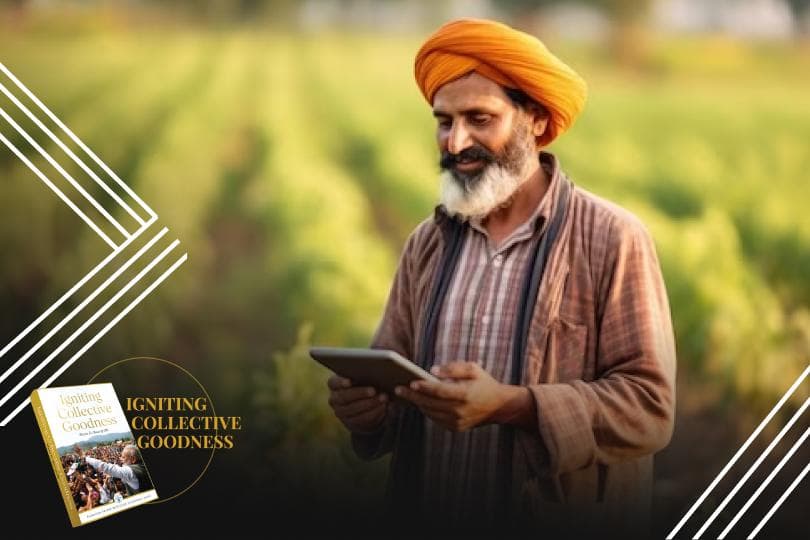How Farmers Are Shaping the Nation's Destiny
A tale of resilience, innovation, and prosperity reshaping India's farming community

As I delved into the chapter titled "Farmers’ Welfare for India’s Welfare" within the book "Igniting Collective Goodness / Mann Ki Baat@100," I was captivated by the depth and significance encapsulated in Prime Minister Narendra Modi's message: “Our farmers are the ‘Annadatas’. (When our farmers prosper, India will prosper.)”
The term 'Annadatas,' rooted in the ancient Sanskrit language, symbolises a provider or giver of food, underscoring the profound respect and recognition of farmers' critical role in India's sustainability and prosperity. With over 70 million native speakers in India, particularly within the Marathi community, the choice of this term by Narendra Modi reflects a deep understanding of the historical and ongoing importance of farmers to the Indian subcontinent. India's distinctive geography, comprising towering mountains, vast deserts, and fertile plains, coupled with its large population and abundant water resources, highlights the agricultural sector's potential to ensure the nation's independence and prosperity.
In an episode of Mann Ki Baat, Modi eloquently expresses his reverence for farmers: “Annanam pataye namah, kshetranam pataye namah,” translating to a homage to the providers of food and a salute to the farmers. He applauds the agricultural advancements made during the COVID-19 pandemic, with significant increases in the production of Kharif crops, paddy, pulses, cereals, oilseeds, and cotton, showcasing the resilience and perseverance of Indian farmers as the foundation of the 'Atmanirbhar Bharat' (Self-Reliant India) initiative.
Modi emphasizes the critical importance of water (Jal) and land (Jameen) in agriculture, advocating for sustainable practices and the well-being of soil and water resources. He highlights innovative approaches to wealth creation from agricultural waste, citing examples such as Murugesan-ji's banana waste rope machine and Virendra Yadav's straw baler conversion, which not only address environmental concerns but also generate additional income for farmers.
The dialogue in Mann Ki Baat sheds light on significant agricultural reforms aimed at doubling farmers' income by 2022-23, with a focus on real income growth, completion of irrigation projects, digital marketplaces through eNAM (National Agriculture Market (eNAM) is a pan-India electronic trading portal), and the deregulation of fruit and vegetable distribution. These reforms have opened new avenues for farmers, offering them freedom in crop selection and direct access to markets, which has transformed the economic landscape for farmers across India.
Modi's leadership through Mann Ki Baat has facilitated a dialogue that has paved the way for long-term agricultural solutions, making a remarkable difference in the lives of farmers. Initiatives such as drip irrigation, "Lab to Land" projects, e-platforms for farm produce delivery, and soil health management have been highlighted and supported, emphasizing the government's commitment to agricultural modernisation and farmer welfare.
The focus on soil health, likened to conducting laboratory tests for the well-being of the land, signifies a holistic approach to agriculture, aiming not only to protect but also to enrich the land. The efforts towards diversification, groundwater level augmentation through farm ponds, and the overall push for modernisation reflect Modi's vision for a prosperous and self-reliant India grounded in the strength and resilience of its farmers.
"Igniting Collective Goodness" and the dialogues within Mann Ki Baat serve as a testament to the transformative power of leadership and community engagement in addressing the challenges and opportunities in agriculture, setting an exemplary model for global leaders. Modi's message, "Our farmers, our villages are the basis of self-reliant India," resonates as a reminder of the fundamental role of agriculture in shaping the nation's future.



































